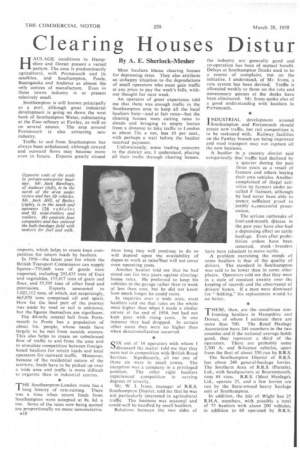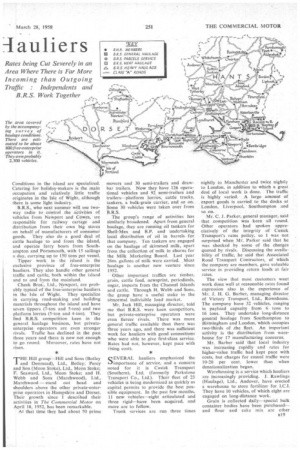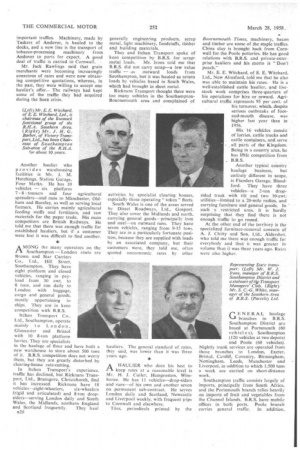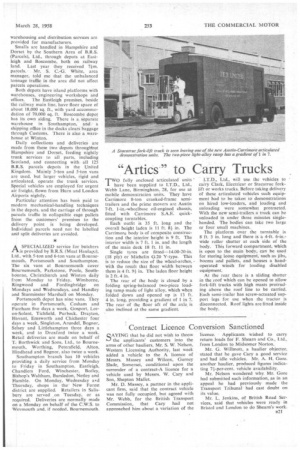Clearing Houses Distur -hullers
Page 52

Page 53

Page 54

Page 55

If you've noticed an error in this article please click here to report it so we can fix it.
By A. E. Sherlock-Mesher
HAULAGE conditions in Hampshire and Dorset present a varied pattern. The area is predominantly agricultural, with Portsmouth and its satellites, and Southampton, Poole, Basingstoke and Andover as almost the only centres of manufacture. Even in those towns industry is at present relatively small.
,Southampton is still known principally as a port, although great industrial development is going on down the west bank of Southampton Water, culminating at the Esso refinery at Fawley, as well as on several estates. The area around Portsmouth is also attracting new industry.
Traffic to and from Southampton has always been unbalanced, although inward and outward flows may become more even in future. Exports greatly exceed imports, which helps to create keen competition for return loads by hauliers.
In 1956—the latest year for which the British Transport Commission can supply figures-739,660 tons of goods were imported, including 293,435 tons of fruit and vegetables, 155,417 tons of grain and flour, and 55,595 tons of other food and provisions. Exports amounted to 1,021,112 tons, of which, not surprisingly, 465,070 tons comprised oil and spirit. How far the land part of the journey was made by road or rail is unknown, hut the figures themselves are significant.
The 40-mile coastal belt from Portsmouth to Poole has a population of about 1 m. people, whose needs have largely to be met from outside sources. This also helps to create an unbalanced flow of traffic to and from the area and to stimulate competition between foreignbased hauliers for return loads and local operators for outward traffic. Moreover, because of the residential nature of the territory, loads have to be picked up over a wide area and traffic is more difficult to organize than in industrial centres.
THE Southampton-London route has a long history of rate-cutting. There was a time when return loads from Southampton were accepted at 8s. 6d. a ton. Some of the rates now being quoted are.proportionally no more remunerative.
B18 Most hauliers blame clearing houses for depressing rates. They also attribute an unhappy situation to the depredations of small operators who must gain traffic at any price to pay the week's bills, without thought for next week.
An operator of great experience told me that there was enough traffic in the Southampton area to keep all the local hauliers busy—and at fair rates—but the clearing houses were cutting rates to shreds and bringing in empty lorries from a distance to take traffic to London at about 23s. a ton, less 10 per cent., with perhaps a wait before the haulier received payment.
Unfortunately, some trading concerns in the district are, I understand, placing all their traffic through clearing houses.
How long they will continue to do so will depend upon the availability of dupes to work at rateslhat will not cover even operating costs.
Another haulier told me that he had stood out for two years against clearinghouse rates. He preferred to keep his vehicles in the garage rather than to work at less than cost, but he did not know how much longer, he could resist.
In inquiries over a wide area, most hauliers told me that rates on the whole were higher than when I made a similar survey at the end of 1954, but had not kept pace with rising costs. In one instance they had dropped. In certain other cases they were no higher than when denationalization occurred.
SIX out of 14 operators with whom 1 discussed the matter told me that they were not in competition with British Road Services. Significantly, all but one of those six were in small towns. The exception was a company in a privileged position. The other eight hauliers experienced competition in varying degrees of severity.
Mr. W. I. Irons, manager of B.R.S. Southampton District, told me that he was not particularly interested in agricultural traffic. The business was seasonal and could well be handled by small hauliers.
Relations between the two sides of the industry are generally good and co-operation has been of mutual benefit. Delays at Southampton Docks used to be a source of complaint, but on the initiative, I understand, of Mr. Irons, a rota system has been devised. Traffic is allocated weekly to those on the rota and unnecessary queues at the docks have been eliminated. Mr. Irons spoke also of a good understanding with hauliers in Portsmouth.
I NDUSTRIAL development around
Southampton and Portsmouth should create new traffic, but rail competition is to be reckoned with. Railway facilities. on the Fawley branch are being improved and road transport may not capture all the new business.
A haulier in a country -district said categorically that traffic had declined by a quarter during the past three years as a result of farmers and others buying their own vehicles. Another complained of illegal activities by farmers under socalled F licences, although he had never been able to secure, sufficient proof to .justify a 'successful prosecution.
The serious outbreaks of foot-and-mouth disease in the past year have also had a depressing effect on cattle haulage. Even after prohibition orders have been removed, stock breeders have been reluctant to move cattle.
A problem exercising the minds of some hauliers is that of the quality of drivers. The standard in Southampton was said to be lower than in some other places. Operators told me that they were in a state of constant anxiety over the keeping of records and the observance of drivers' hours. If a man were dismissed for "fiddling," his replacement would 1.,e no better.
THESE, then, are the conditions con
fronting hauliers in Hampshire and Dorset, of whom I estimate there are more than 700. The Road Haulage Association have 244 members in the two counties and if the national average holds good, they represent a third of the operators. There are probably some 2,300 Aand B-licence vehicles, apart from the fleet of about 350 run by B.RS.
The Southampton District of II.R.S. has about 240 general-haulage lorries. The Southern Area of B.R.S. (Parcels), Ltd., with headquarters at Bournemouth, runs 84 vans. B.R.S. (Meat Haulage), Ltd., operate 25, and a few lorries are run by the State-owned heavy haulage unit at Southampton. .
In addition, the Isle. of Wight has 25 R.H.A. members, with possibly a total of 75 hauliers with about 200 vehicles, in addition to 60 operated by B.R.S. Conditions in the island are specialized. Catering for holiday-makers is the main occupation and relatively little traffic originates in the Isle of Wight, although there is some light industry.
B.R.S., who next summer will use twoway radio to control the activities of vehicles from Newport and Cowes, Ire responsible for railway cartage and distribution from their own big stores on behalf of manufacturers of consumer goods. They also do a good deal of cattle haulage to and from the island, and operate ferry boats from Southampton and Portsmouth, with 15 sailings a day, carrying up to 150 tons per vessel.
Tipper work in the island is the exclusive province of free-enterprise hauliers. They also handle other general traffic and cattle, both within the island and to and from the mainland.
Cheek Bros., Ltd., Newport, are probably typical of the free-enterprise hauliers in the Isle of Wight. They specialize in carrying road-making and building materials throughout the island and have seven tippers (7-ton and 5-ton) and two platform lorries (5-ton and 4-ton). They find B.R;S. competition keen in the general haulage business, but privateenterprise operators are even stronger rivals. Traffic has declined in the past three years and there is now not enough to go round. Moreover, rates have not risen.
THE Hill group.—Hill and Sons (Batley and Denmead), Ltd., Botley; Percy and Son (Meon Stoke), Ltd., Meon Stoke; F. Seaward, Ltd., Meon Stoke; and H. Webb and Sons (Marchwood), Ltd., Marchwood— stand out bead and shoulders above the other private-enterprise operators in Hampshire and DOrset. Their growth since I described their activities in The Commercial Motor on April 18, 1952, has been remarkable.
At that time they had about 50 prime
movers and 30 semi-trailers and drawbar trailers. Now they have 126 operational vehicles and 92 semi-trailers and trailers—platform lorries, cattle trucks, tankers, a bulk-grain carrier, and so on. Some 30 vehicles were taken over from B.R.S.
The group's range of activities has similarly broadened. Apart from general haulage, they are running oil tankers for Shell-Mex and B.F. and undertaking local distribution of oil in barrels for that company. Ten tankers are engaged on the haulage of skimmed milk, apart from the collection of milk in churns for the Milk Marketing Board. Last year 26m. gallons of milk were carried. Meat haulage is another new venture since 1952.
Other important traffics are timber, grain, cattle feed, newsprint, periodicals, sugar, imports from the Channel Islands and cattle. Through H. Webb and Sons, the group have a useful stake in the abnormal indivisible load market.
Mr. Jack Hill, managing director, told me that B.R.S. were keen competitors, but private-enterprise operators were even fiercer rivals. There was more general traffic available than there was three years ago, and there was sufficient work for hauliers with good connections who were able to give first-class service. Rates had not, however, kept pace with rising costs.
SEVERAL hauliers emphasized the importance of service, and a concern noted for it is Cusick Transport (Southern), Ltd. (formerly Parkstone Transport Co., Ltd.). Their fleet of 23 vehicles is being modernized as quickly as capital permits to provide the best possible equipment. In the past few months, 11 new vehicles—eight articulated and three rigid—have been acquired, and more are to follow.
Trunk services are run three times nightly to Manchester and twice nightly to London, in addition to which a great deal of local work is done. The traffic is highly varied. A large amount of export goods is carried to the docks at London, Liverpool, Southampton and so on.
Mr. C. J. Parker, general manager, said that competition was keen all round. Other operators had spoken appreciatively of the integrity of Cusick Transport's rates policy, so I was not surprised when Mr. Parker said that he was shocked by some of the charges quoted by rivals. Discussing the availability of traffic, he said that Associated Road Transport Contractors, of which the company are members, gave valuable service in providing return loads at fair rates.
The view that most customers want work done well at reasonable rates found expression also in the experience of Mr. J. H. G. Barber, managing director of Victory Transport, Ltd., Rownhams. The company have 32 vehicles, ranging in payload capacity from 6 tons to 16 tons. They undertake long-distance general haulage from Southampton to Birmingham and London, which occupies two-thirds of .the fleet. An important activity is the distribution from warehouse for 17 manufacturing concerns.
Mr. Barber said that local industry was increasing rapidly and rates for higher-value traffic had kept pace with costs, but charges for casual traffic were 10-20 per cent, lower than when denationalization began.
Warehousing is a service which hauliers are increasingly providing. J. Rawlings (Haulage), Ltd., Andover, have erected a warehouse to store fertilizer for 1.C.I. They have 10 vehicles, of which eight are engaged on long-distance work.
Grain is collected daily—special bulk container bodies have been purchased— and flour and cake mix are other B19 important traffics. Machinery, made by Taskers of Andover, is hauled to the docks, and a new line is the transport of tobacco-processing machinery from Andover to ports for export. A good deal of traffic is carried to Cornwall.
Mr. Jack Rawlings said that grain merchants were becoming increasingly conscious of rates and were now obtaining competitive quotations, whereas, in the past, they were willing to accept one haulier's offer.The railways had kept some of the traffic they had acquired during the Suez crisis.
Another haulier who p r o vides warehousing facilities is Mr. J. M. Hutchings, Station Garage, Four Marks. He has 10 vehicles — six platform 7 8 tonners and four agricultural spreaders—and runs to Manchester, Oldham and Burnley, as well as serving local farmers. He carries mainly agricultural feeding stuffs and fertilizers, and raw materials for the paper trade. His main competitors are British Railways. He told me that there was enough traffic for established hauliers, but if a customer were lost it was difficult to find another.
AMONG the many operators on the Southampton —London route are Brown and Star Carriers Co., Ltd., Hill Street, Southampton. They have eight platform and closed vehicles, ranging in payload from 30 cwt. to
8 tons, and run daily to London with baggage, cargo and general goods, mostly appertaining to ships. They are in keen competition with B.R.S.
ltchen Transport Co., Ltd., Southampton, operate mainly to London, Gloucester and Bristol with 10 8-ton platform lorries. They are specialists in the haulage of flour and have built a new warehouse to store about 500 tons of it. B.R.S. competition does not worry them, but they are greatly disturbed by clearing-house rate-cutting.
In Itchen Transport's experience, traffic has declined, but Ricknans Transport, Ltd., Bransgore, Christchurch, find it has increased. Ricknans have 18 vehicles—eight-wheelers, six-wheelers (rigid and articulated) and 8-ton dropsiders—serving London daily and South Wales, the Midlands, northern England and Scotland frequently. They haul a20 generally engineering products, scrap metal, light machinery, foodstuffs, timber and building materials.
They and lichen Transport spoke of keen competition by B.R.S. for scrap metal loads. Mr. Irons told me that B.R.S. did not carry scrap—a low value traffic — as outward loads from Southampton, but it was hauled as return loads by vehicles based in South Wales, which had brought in sheet metal.
Ricknans Transport thought there were too many vehicles in the SouthamptonBournemouth area and complained of activities by specialist clearing houses, especially those operating " token fleets.
South Wales is one of the areas served by Direct Roadways, Ltd., Gosport. They also cover the Midlands and north, carrying general goods—principally iron and steel—on outward runs. They have seven vehicles, ranging from 9-15 tons. They are in a particularly fortunate position, because they are supplied with loads by an associated company, but their customers were, they told me, often quoted uneconomic rates by other AHAULIER who does his best to keep rates at a reasonable level is Mr. H. J. Cutler, Hampreston, Witnborne. He has 11 vehicles—drop-siders and vans—of his own and another seven on permanent sub-contract. He serves London daily and Scotland, Newcastle and Liverpool weekly, with frequent trips to Cornwall and elsewhere.
Tiles, periodicals printed by the
Bournemouth Times, machinery, bacon and timber are some of the staple traffics. China clay is brought back from Cornwall for the Poole potteries. He has good relations with B.R.S. and private-enterprise hauliers and his motto is " Don't poach."
Mr. E. E. Witchard, of E. E. Witchard, Ltd., New Alresford, told me that he also was able to maintain his rates. • He is a well-established cattle 'haulier, and livestock work comprises three-quarters of his operations for hire or reward. Agricultural traffic represents 95 per cent, of his turnover, which, despite serious outbreaks of foot and-mouth disease, was higher last year than in 1956.
His 16 vehicles consist of lorries, cattle trucks and cattle containers, and serve ■ all Oath of the Kingdom.
Being in a country area, he has little competition from . B.R.S.
Another typical country haulage business, but entirely different in scope, is Fianders Garage, Bland ford. They have three vehicles—a 2-ton dropsided truck with tilt and two 10-cwt.utilities—limited to a 20-mile radius, and carrying furniture and general goods. In such a restricted area, it is hardly surprising that they find there is not enough traffic to go round.
At the other end of the territory is the specialized furniture-removal concern of A. J. Chitty and Son, Ltd., Aldershot, who told me there was enough traffic for everybody and that it was greater in volume than it was three years ago. Rates were also higher.
GENER AL haulage branches in B.R.S. Southampton District are based at Portsmouth (60 vehicle s), Southampton (120 vehicles at two depots) and Poole (60 vehicles). Nightly trunk services are operated from those branches to London, Exeter, Bristol, Cardiff, Coventry, Birmingham, Nottingham, Leeds, Manchester and Liverpool, in addition to which 1,500 tons a week are carried on short-distance work.
Southampton traffic consists largely of imports, principally from South Africa. and the Portsmouth branch relies heavily on imports of fruit and vegetables from the Channel Islands. B.R.S. have mobile offices in both ports. Poole branch carries general traffic. In addition. warehousing and distribution services are provided for manufacturers.
Smalls are handled in Hampshire and Dorset by the Southern Area of B.R.S. (Parcels), Ltd., through depots at Eastleigh and Boscombe, both on railway land. Last year they received 7-irn. parcels. Mr. S. C.-G. White, area manager, told me that the unbalanced tonnage traffic in the area did not affect parcels operations.
Both depots have island platforms with warehouses, engineering workshops and
offices. The Eastleigh premises. beside the railway main line, have floor space of about 18,000 sq. ft., with yard accommodation of 70,000 sq. ft. Boscombe depot has its own siding. There is a. separate warehouse in Southampton, and a shipping office in the docks clearsbaggage through Customs. There is also a warehouse at Winton.
Daily collections and deliveries are made from these two depots throughbut Hampshire and Dorset, feeding nightly trunk services to all parts, including Scotland, and connecting with. all 125 B.R.S. parcels depots in the United Kingdom. Mainly 3-ton and 5-ton vans are used, but larger vehicles, rigid and articulated, operate the trunk services. Special vehicles are employed for urgent air freight, flown from Hum n and London Airports nightly.
Particular attention has been paid to modern mechanical-handling techniques in the depots, and the carriage of through parcels traffic in collapsible cage pallets from the customers' premises to the delivery point is being developed. Individual parcels need not be labelled and split deliveries are avoided.
ASPECIALIZED service for butchtss is provided by 13.R.S. (Meat Bantam), Ltd., with 5-ton and 6-ton vans at Bournemouth, Portsmouth and Southampton. The six vans at Bournemouth cover Bournemouth, Parks tone, Poole, Southbourne, Christchurch and Winton daily from Monday to Friday, Wimborne, Ringwood and Fordingbridge on Mondays and Wednesdays, and Handley and Sturminster Marshall on Monday.
Portsmouth depot has nine vans. They operate in Portsmouth, Cosham and Farcham five days a week, Gosport, Leeon-Solent, Tichfield, Purbeck, Drayton, Havant, Emsworth and Chichester four days a week, Singleton, Arundel, Bognor, Selsey and Littlehampton three days a week, and to Droxford twice a week. Retail deliveries are made on behalf of T. Borthwick and Sons, Ltd., to Bournemouth, Worthing, Petersfield, Alton, Hindhead and Bognor, also twice a week.
Southampton branch has 10 vehicles providing a daily service from Monday to Friday in Southampton. Eastleigh, Chandlers Ford, Winchester, Botley, Bishop's Waltham, Bursledon, Netley and Ramble. On Monday, Wednesday a.-Ad Thursday, shops in the New Forest district are supplied. Retailers in Salisbury are served on Tuesday, or as required. Deliveries are normally made on a Monday on behalf of the C.W.S. to Weymouth and, if needed. Bournemouth.




















































































































